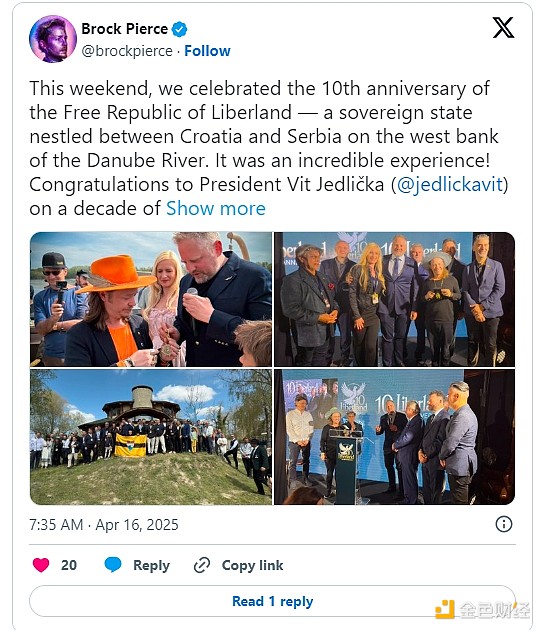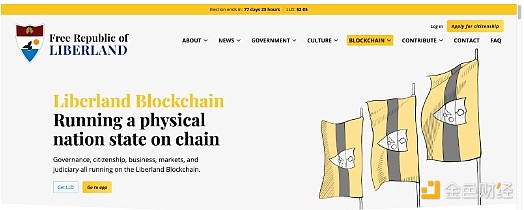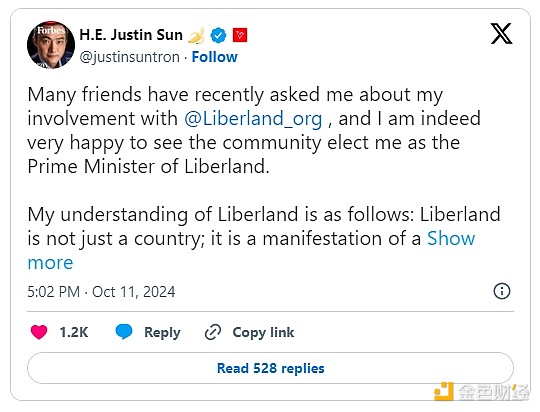Author: David Canellis, Blockworks; Translator: Baishui, Golden Finance
The land of freedom has fallen.
This story is almost as old as Bitcoin itself. One day, you bought a little Bitcoin. Hoarded Bitcoin on Saturday.
Suddenly, you stumbled upon a video about stablecoin earnings in your news feed. It’s all the algorithm’s fault.
Then, you saw a screenshot of memecoin generational earnings. A string of governance airdrop tweets followed; farmers got rich, KOLs got richer. What about you? Totally FOMO-ed.
Congratulations! You’ve been radicalized by the Web3 cabal.
All of your remaining Bitcoins were redistributed to the top 50 altcoins, weighted by their respective partnerships and MOUs. “E/acc” was unironically added to your X username.
Today – Liberland Embraces Bitcoin
It’s enough to make one sick. After looking at Liberland, the libertarian Balkan microstate founded in 2015, I feared it would suffer a similar fate.
Liberland wasn’t really the ultimate Bitcoin paradise it was advertised to be. Czech politician and activist Vít Jedlička founded Liberland under the rules of Terra nullius, initially positioning this “three square miles of no man’s land” on the west bank of the Danube as a libertarian refuge for the world. A small sanctuary for “honest people”, away from big government, central banks and taxes.
It’s not hard to see how Bitcoin once fit into this vision. Bitcoin was, and still is, a symbol of what’s possible under laissez-faire capitalism – proof that people can change the infrastructure of our world by taking control of themselves.
While Liberland has no “legal currency,” Bitcoin is indeed accepted as money within its borders, alongside nearly every other currency, and even, as Jedlicka himself warned in his initial media appearances, there will be a “Bitcoin-like” official Liberland cryptocurrency in the future.
Perhaps Jedlicka and Satoshi have similar audacity. Liberland sounds like the far-flung dream that Bitcoin once was.
After arrests, court battles, settlement attempts, festivals, and brief exiles, today the Free Republic of Liberland has more than 1,100 registered citizens, more than 4,000 e-residents, and more than 700,000 waiting list applicants. But as a 2023 report notes, there are very few Liberland citizens who actually live there. Instead, there are only “a handful of activists anchored on a houseboat downstream, under heavy surveillance by Croatian police.”

But whatever spiritual affinity there may have been between Bitcoin and Liberland, which originally attracted so many people to its remote floodplain in Europe, it has all but disappeared from public information about the country.
One might have expected the connection between Liberland and Bitcoin to strengthen over the past decade, especially given that the price of Bitcoin has risen nearly 200-fold since early reports that the majority of Liberland’s reserves were in Bitcoin (BTC). If true, the micronation must be relatively wealthy.
(It’s worth noting that Liberland’s known Bitcoin addresses currently hold less than $2,000 worth of Bitcoin, but a total of 275 BTC have flowed in—worth $23 million at current prices. Liberland deposited its last Bitcoin into the cryptocurrency exchange Bitcoin Suisse in August 2020.)
Today, the word “Bitcoin” is nowhere to be found on Liberland’s official website, except for what appears to be a mention of it as the currency of choice alongside Liberland’s own.

There is blockchain governance, and there is blockchain government.
Instead, Liberland.org is littered with blockchain’s worst buzzwords: soul-bound NFTs representing citizenship, on-chain governance that enables a “decentralized super-democracy,” all powered by “an operational token similar to DOT or ETH” that users can bridge to TRX and a handful of other blockchains.
As President Jedlička said in 2016, it took Liberland just 10 years to go from an economy based on Bitcoin to one based on an inflationary governance token, “Liberland Dollars,” issued on a Polkadot fork called the “Liberland Blockchain.”
Liberland Merit is a secondary token designed to represent ownership of actual land. The site promises that someday these tokens can be “converted into tokenized political power,” giving citizens more ways to vote.

The Liberland National Congress Party recently elected Justin Sun as prime minister for a second term.
Currently, Liberland is essentially a token economy experiment to build a blockchain-powered nation that doesn’t actually exist.
Nevertheless, the government receives monthly unlocks of vested tokens to fund itself and its various initiatives (including listings on cryptocurrency exchanges, marketing, and incentives) in much the same way that venture capital firms receive proceeds from Web3 companies in their portfolios. Bitcoin’s current market cap is $2.1 million.
Just as there are no real Scotsmen, there are certainly no real "Bitcoiners". There are undoubtedly many of them among Liberland's residents, believers, supporters and investors.
All of this only makes Liberland's current version and all its nonsense all the more disappointing. Fortunately, it's never too late to adopt the Bitcoin standard - although good luck getting the votes.
 Brian
Brian
 Brian
Brian Alex
Alex Joy
Joy Joy
Joy Joy
Joy Joy
Joy Joy
Joy Alex
Alex Anais
Anais